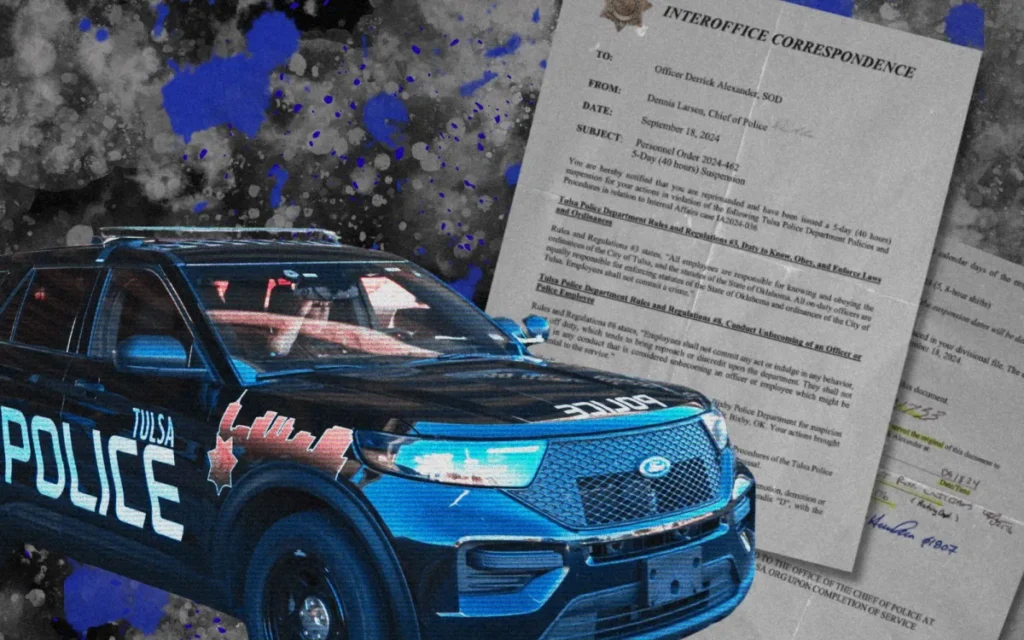Tulsa police disciplined six officers suspected of driving drunk, some weren’t criminally charged

Most officers suspected of driving under the influence received suspensions ranging from three to 16 days, records the Tulsa police union tried to keep secret show.
Tulsa police disciplined six officers suspected of driving drunk, some weren’t criminally charged.
By: Ashlynd Huffman
A sharp screeching late one night in June 2024 grabbed the attention of a Bixby Police officer. He looked over to see a black SUV sending up sparks as it ground forward on one flat tire and another with a bare rim. The officer flipped on his patrol lights and pulled the SUV over.
Tulsa Police Officer Derrick Alexander, a nearly 30-year veteran of the force, emerged from the vehicle, wearing a blue Tulsa Police Department T-shirt for the agency’s youth mentoring program, according to police body camera footage that later aired on local TV news. He was unsteady on his feet, smelled of alcohol, and had red, watery eyes, according to a police report. The front end of Alexander’s SUV had “significant” damage. Bixby police officer Aaron Godwin observed. Alexander was reluctant to tell the officer if he had been drinking at first, but eventually said he had two drinks earlier that evening.
“I don’t know him, but he’s (Tulsa Police Department). He was rolling on rims,” Godwin said in the body camera video. “Looks like he might have hit something.”
Alexander declined to take field sobriety and breathalyzer tests, so Godwin arrested him on suspicion of driving under the influence and driving a vehicle without the required equipment or in unsafe conditions, the police report said.
But Alexander didn’t face criminal charges after the incident. He was removed from his position as a school resource officer but went back to work at the Tulsa Police Department after a five-day suspension in September 2024, records show. A department spokesperson said that Alexander was released from restricted duty on April 4, meaning he can have his gun and police badge back.
The Frontier reached out to Alexander for comment but did not receive a response.
The Tulsa Police Department has disciplined six officers after incidents where they were suspected of driving under the influence since 2016, a Frontier investigation has found. In one case, an officer was suspected of causing a wreck after driving under the influence and leaving the scene of the accident. In another case, an officer was accused of driving her city-issued vehicle after drinking and was involved in a crash. Neither officer was criminally charged. Just three of the six officers faced criminal charges in either the state or the municipal court.
At least four officers returned to work, keeping law and order in Tulsa after brief suspensions. The Frontier filed a request under the Oklahoma Open Records Act with the police department for officer disciplinary records in March, but the Tulsa police union went to court to try to keep many documents secret. When a judge ruled the records should be released, the documents showed most of the officers suspected of driving while intoxicated received suspensions ranging from three to 16 days. One officer lost two days of accrued vacation time instead of suspension.
The Tulsa Police Department had criminal jurisdiction over four of the six suspected DUI cases but referred only two for criminal prosecution, according to records from the district attorney’s office and municipal court. Owasso and Bixby police investigated the other two cases and forwarded both cases for criminal charges.
The Tulsa Police Department said there wasn’t enough evidence to charge one officer. In another incident, a police officer told her supervisor that she was involved in a car accident but the Tulsa Police Department didn’t find out that alcohol might have been involved until later, when criminal charges would have been difficult to pursue, a spokesperson for the department told The Frontier.
Jeff Downs, president of the Tulsa Fraternal Order of Police, said he believed officers suspected of driving while intoxicated should not receive any preferential treatment.
“Our opinion is that if an officer is accused of a crime, then they should be treated like anyone else in that same position,” Downs said. “No better or no worse, and that they’re treated the same for a criminal process.”
All six officers are still certified police officers in Oklahoma, and all but two are still working at the Tulsa Police Department.
The Council on Law Enforcement and Training, the Oklahoma state agency that licenses police officers, no longer revokes an officer’s license if they are convicted of misdemeanor driving under the influence. Preston Draper, acting director, said that in the past, the licensing agency viewed driving under the influence as a crime of moral turpitude, which could cause an officer to lose their policing license, but the agency recently changed its stance after an officer won a court ruling challenging that policy.
Draper said he relies on individual departments and officers to self-report; otherwise, the Council on Law Enforcement and Training won’t know about the case unless it ends up in the news.
No criminal charges
The Bixby Police Department sent Alexander’s case to the Tulsa County District Attorney’s Office for criminal prosecution. But District Attorney Steve Kuntzweiler declined to prosecute the case. Kunzweiler said he didn’t believe there was enough evidence to charge Alexander with driving under the influence.
“We believed there was insufficient evidence to convict him beyond a reasonable doubt,” Kunzweiler said in an interview.
Kunzweiler later said in emailed responses to follow-up questions that two senior attorneys at his office reviewed the police body and dash camera video from the arrest and found that it “did not appear to reflect that Mr. Alexander was impaired.”
Kunzweiler said that the Bixby Police Department’s lack of sobriety tests on Alexander was another factor in deciding not to file criminal charges.
But the Oklahoma Court of Criminal Appeals has ruled that refusing sobriety tests can be used as evidence of guilt in court. Bruce Edge, a Tulsa-based DUI lawyer, told The Frontier that refusing such tests often allows prosecutors to build a stronger criminal case.
Even without criminal charges, a Tulsa County judge still found there was enough evidence for state officials to modify Alexander’s driving privileges. His license was revoked for 180 days, and he was required to drive with a breathalyser in his personal vehicle, according to a Tulsa County judge’s ruling.
Dennis Larsen, who became Tulsa’s chief of police in May 2024, made the final decision regarding Alexander’s discipline. He also served as deputy chief when the other officers were disciplined.
The Tulsa Police Department uses a disciplinary matrix to determine consequences for officers who violate agency policies. Local TV news stations aired footage of Alexander’s arrest and his jail booking photo, and the department can give officers harsher consequences for actions that “appreciably and negatively affect the public’s confidence or trust in the Department,” according to the matrix. The disciplinary matrix says that the agency can weigh an officer’s past history of good conduct to give a lighter punishment for policy violations.
Larsen said Alexander had “glowing performance” reviews and, since Kunzweiler’s office didn’t file criminal charges, he didn’t have to consider an aggravating factor when issuing the discipline.
“That hurt the department’s image,” Larsen said. “He was basically balanced out against his 30-plus years and working as a school resource officer and all the stuff he’s done with kids.”
Roy Bedard, a police expert, consultant and trainer, said that the lack of criminal charges should not have factored into Alexander’s discipline.
“I don’t agree with it, because the administrative investigation has very little to do with the criminal investigation,” Bedard said. “It’s an independent investigation. It doesn’t sit around waiting to see what the prosecutor did.”
Calls for accountability
There were calls for the Tulsa Police Department to add more public oversight for officer discipline after Officer Betty Shelby shot and killed Terrance Crutcher, an unarmed Black man, in 2016. A jury ultimately acquitted Shelby of manslaughter, but all 12 members signed a statement opposing her continued employment as a patrol officer.
Independent oversight can help make police departments accountable to their communities, said Cameron McEllhiney, the executive director of the National Association for Civilian Oversight of Law Enforcement, a group that works for reforms.
“It allows you to be able to look at very specific things like how discipline is being administered or how use of force is being reported,” she said.
In 2017, Mayor G.T. Bynum appointed the Tulsa Commission on Community Policing to suggest reforms. One of the commission’s recommendations was to improve oversight through community meetings and groups.
The city created a citizens advisory board that same year, which meets with police department officials to discuss community policing and public safety solutions, but it has no decision-making authority or other powers regarding officer discipline.
Bynum proposed creating the Office of Independent Monitoring in January 2019, a board that would review how the Tulsa Police Department disciplined officers, but it wouldn’t have any decision-making authority.
The international nongovernmental agency Human Rights Watch called for Tulsa to take more forceful action and install an independent board that would have the power to conduct its own investigations and decide how officers would be disciplined.
But by September 2019, Bynum pulled the plug on the Office of Independent Monitoring after facing opposition from the police union.
Bynum didn’t respond to The Frontier’s multiple requests for comment.
The Office of Independent Monitoring did not come up publicly again until a 2022 city council meeting, when 20 members of the public spoke out in favor of adding a police oversight board to the city charter.
City councilors voted 7 to 2 against adding the oversight board to the city charter. Connie Dodson, a former District 6 city councilor, moved to deny the amendment to the charter. Dodson said at the meeting that she opposed moving forward with the proposal based on legal advice that the police union could challenge the action.
Vanessa Hall-Harper, a city councilor for District 1, told The Frontier that the police department and police union both fought hard to prevent independent monitoring.
“The power has grown over the years to the point that they are in the driver’s seat. They’re making all the decisions, and the citizens suffer,” Hall-Harper said.
The leader of the Tulsa Fraternal Order of Police said he believes that the addition of an oversight board would have to be negotiated and agreed upon between the city and union as part of their collective bargaining agreement.
Jeff Downs, the president of the union, said he wouldn’t support an Office of Independent Monitoring “that does nothing” because he believes it doesn’t foster better relationships between the community and police.
The Tulsa chief of police said in an emailed statement that the agency complies with state standards on law enforcement policies and practices and that it is committed to transparency. The chief didn’t respond to questions on whether the Tulsa Police Department supported adding an office of independent monitoring.
After Hall-Harper publicly criticized the Tulsa Police Department, the agency referred her husband, a former lieutenant with the agency, for criminal charges. Court records show that her husband, Marcus Harper, faced felony charges in 2021 after he was accused of helping cover up a shooting involving the family friend of another police officer.
The Tulsa Police Department said in an emailed statement that the agency has no reason to believe the charges were filed in retaliation. The department couldn’t disclose further details because the investigation remains open, the email said.
A Tulsa County judge found Harper not guilty at the non-jury trial in 2024. Harper sued the City of Tulsa and the police department, and prosecutors for malicious prosecution, abuse of process and infliction of emotional distress. However, Harper asked the judge to dismiss his lawsuit in August.
A spokesperson for the City of Tulsa declined to comment on the lawsuit. Hall-Harper didn’t respond to The Frontier’s questions about why the lawsuit was dismissed.
Hall-Harper said she and other councilors are planning to raise the issue of police oversight again. Mayor Monroe Nichols, who took office in December 2024, has no plans to try to reintroduce an Office of Independent Monitor, Laurel Roberts, the mayor’s public safety commissioner, wrote in an emailed statement.
- “This story originally appeared on The Frontier.”
- Provide a visible link to the original story on The Frontier:
https://www.readfrontier.org/…/tulsa-police-disciplined-six-officers-suspected-of-driving-drunk-some-werent-criminally-charged/









